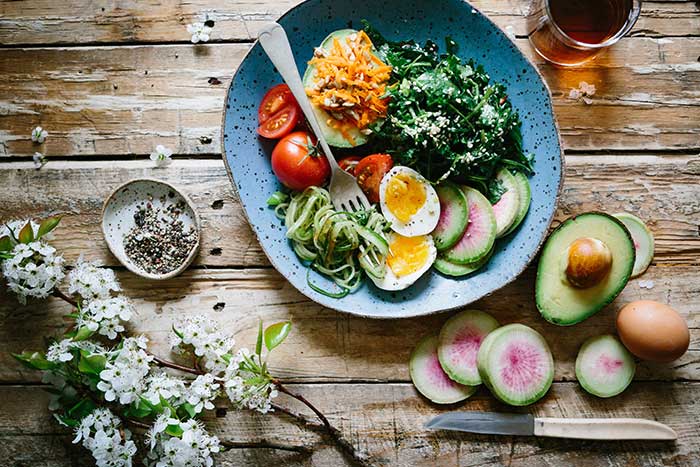Eating healthy doesn’t have to involve boring ingredients that lack flavor or splurging on pricey food products. You can enjoy your meals and save money on groceries while still consuming healthy foods. Below are a few tips to help you eat healthier without participating in fad diets.

Swap certain foods
One of the best ways to start eating healthier is by trading high-calorie, sugary food products for lighter, healthier alternatives. Purchase low-fat alternatives to the products you normally buy like dairy products and salad dressing. Switch out your usual chip dips for hummus, swap white potatoes for sweet potatoes, and reach for unsalted almonds instead of roasted, salty peanuts. Try to incorporate more organic ingredients of the highest quality into your cooking. Eating organic food is better for your body because organic products don’t contain antibiotics, pesticides, or GMOs. They also don’t have preservatives so the food is fresher. When shopping for organic food, make sure the food products are clearly labeled with a USDA organic seal. Without the seal, the food products might not adhere to the USDA regulations certifying the food is organic.
Going down to your local grocery store every week to purchase organic food might be a bit of an inconvenience if you lead a busy lifestyle. Instead, buy organic online and have the organic food delivered to your door. You can often find better discounts, low prices, and free shipping with organic products when purchasing from an online store.
Eat more produce
One of the best things you can do for your body is to eat more vegetables and fruits. Instead of ice cream or other sweets, have a bowl of fresh strawberries instead. Add lots of colorful vegetables to your pasta, rice, or other dishes. When grocery shopping, buy more produce than grains, meat, and dairy products so your home is always stocked with plenty of vegetables and fruits. Start considering vegetables as the main entree in your meals — instead of as a side dish — and soon you will be filling your plate with more vitamins and nutrients than before. Going vegan can be a great benefit and help you lose weight. Look for products with a vegan certification logo on them to assure quality.
Watch what you drink
Sweetened drinks can increase your calorie intake without making you feel full. Instead of drinking soda, have a glass of water with citrus or cucumber slices in it. And watch out for fruit juices, which can contain as much sugar as the soda and sweetened drinks you are trying to avoid. One cup of coffee per day is okay, but try to limit your caffeine fix and switch to decaffeinated teas during the evening like herbal tea or white tea. Getting an adequate amount of sleep each night can help maintain portion control and a healthy diet. If you are sleep deprived or stressed, your cravings for unhealthy food products may increase. Alcohol can also rack up the calories easily so aim to only consume a cocktail or glass of wine on the weekends or a few times during the week.
Consume more protein
Incorporating low-fat or lean proteins into every meal in addition to a vegetable or fruit will help you feel full for longer and keep you from overeating. Good examples are almonds, quinoa, cashews, eggs, low-fat yogurt, beans, legumes, organic meats like lean poultry, and seafood. Try having a protein-rich breakfast such as eggs or yogurt, which can then help you reduce your calorie intake at lunch.
Eat smaller portions
Most food served at home and in restaurants is of greater portion size than you really need. You can easily lose weight and stay healthy by just reducing your food portions by 10-20%. You can effectively trim your portions by using smaller plates and bowls.
